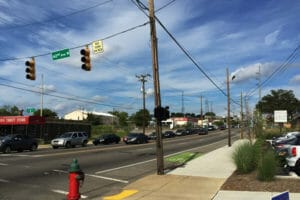Nashville, TN
Charlotte Avenue
About the Corridor
ULI Nashville and partners are working on a 4 mile segment of Charlotte Avenue near downtown Nashville, considered a main traffic throughway from downtown to the western suburbs. The northern side of the corridor is home to Nashville’s historically African-American neighborhoods, cultural arts centers, and universities; these neighborhoods also have social inequities and poor health outcomes. The southern side is where the city’s long-standing medical district resides. Though there is current public and private investment along the corridor, uncoordinated development patterns offer an opportunity to implement more strategic principles, actions, and partnerships that support and improve the health of the adjacent neighborhoods and business-users, and that could be replicated along other corridors across Nashville.
Local Workshop
The workshop in Nashville built on previous corridor work, and was framed as a development charrette to ensure this effort is action-oriented. Pre-workshop, the team organized a “Scavenger Hunt” to inventory corridor assets. Key issues include the need to create a brand along the corridor with new signage and a unifying vision, and to form a single organizational implementation center to collect, organize, and fund changes. Next steps include reaching out to key partners (universities, healthcare institutions, residents, businesses, community-serving non-profits), identifying initial branding opportunities, and identifying an organizational entity to catalyze change along the corridor.
The Nashville local workshop was held on August 10 and 11, 2015.
To read more about other demonstration corridors’ local workshops, click here.
National Study Visit
The Local Leadership Group in Nashville asked the expert participants to consider the following key study questions:
- How do we promote health along Charlotte Avenue?
- How do we bring together champions for change, and keep people engaged over the long haul?
- How can/should corridor improvements be funded and financed?
- What are quick wins/opportunities for immediate action?
The participants recognized that there is urgency in developing a comprehensively healthy strategy for Charlotte Avenue due to development pressures and obsolete infrastructure, and that addressing challenges—including a current emphasis on the automobile, limited options for fresh food, and insufficient infrastructure—would be easier to address prior to or concurrent with expected new development. Recommendations put forward by the participants include: a process for creating an entity (such as a Business Improvement District) that could manage the corridor redevelopment; enhancing connectivity along the corridor through strategies such as adding pedestrian and bike infrastructure, improving the current Bus Rapid Transit system, and utilize the current greenway plan to connect neighborhoods across the corridor; creating opportunities for new restaurants, grocery stores, and food education to bring healthy food to the corridor; and potential funding strategies, including private sector seed investment in the corridor organizing entity.
The Nashville National Study Visit was held January 13-15, 2016. View final presentation. Read about the National Study Visits for other Demonstration Corridors.
In the News
Study blueprints a healthier, welcoming Charlotte Avenue
January 15, 2016
The Tennessean
Urban planners try to improve Charlotte Avenue
August 11, 2015
The Tennessean
Learn More
Read the full Charlotte Avenue case study featured in the Healthy Corridors Report.
